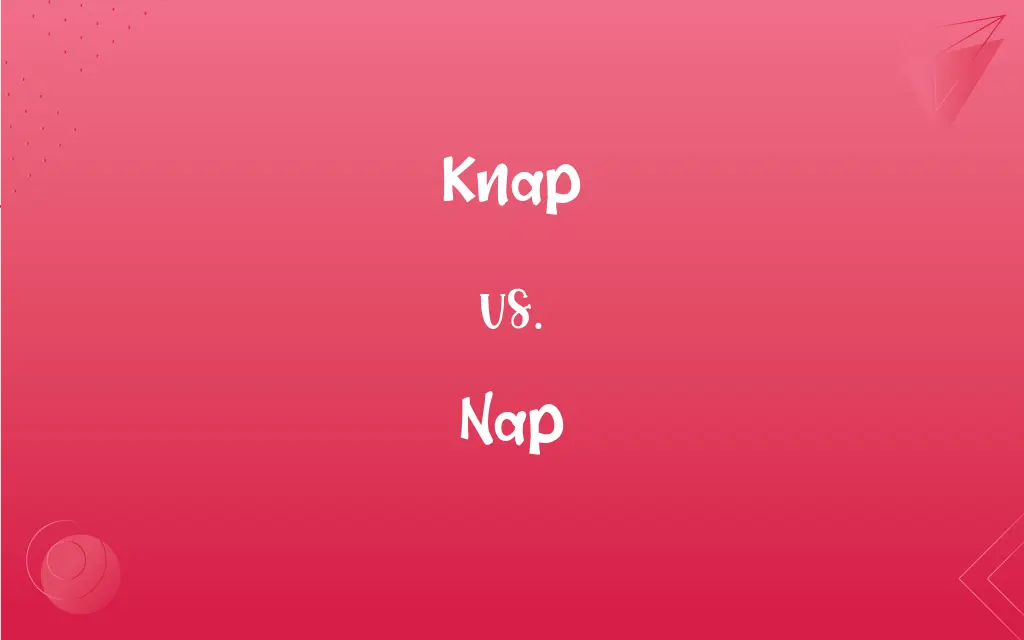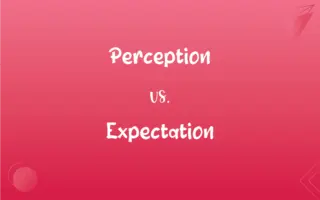Knap vs. Nap: What's the Difference?
Edited by Aimie Carlson || By Janet White || Updated on January 16, 2024
"Knap" refers to breaking or striking something sharply, while "nap" means a short sleep.

Key Differences
The word "knap" is often used in contexts related to breaking or shaping a hard material with a sharp blow. It implies a precise, skillful action, especially in stonework or metalwork. Conversely, "nap" is commonly associated with sleep, specifically a brief and light period of rest. It signifies a temporary disengagement from activities for relaxation.
In terms of etymology, "knap" stems from Old English 'cnæpp' meaning a sharp blow or strike, often used in reference to crafting or shaping objects. On the other hand, "nap," derived from the Middle English 'nappen,' relates to slumber, particularly of a short and quick nature. This distinction in origin reflects the varied applications of these words in modern usage.
When considering phonetics, both "knap" and "nap" are single-syllable words, but they diverge in their sound and tone. "Knap" has a slightly more abrupt and harder sound due to the presence of the 'k' consonant. In contrast, "nap" starts with a softer and more fluid 'n' sound, aligning with its more relaxed and gentle connotation.
Usage of "knap" can be found in more specialized or technical contexts such as geology, archaeology, or craftsmanship, where precision is key. "Nap," however, finds its place in everyday language, used to describe common activities related to rest and relaxation, making it a more universally understood term.
Comparison Chart
Meaning
To break or strike sharply, often related to shaping materials
A short, light sleep
ADVERTISEMENT
Usage Context
More technical, related to craftsmanship and material processing
Common, everyday use related to rest
Phonetics
Begins with a hard 'k' sound, implying sharpness
Begins with a soft 'n' sound, suggesting gentleness
Etymology
From Old English 'cnæpp', meaning a sharp blow
From Middle English 'nappen', meaning to sleep briefly
Connotation
Technical, precise action
Relaxation, temporary disengagement
Knap and Nap Definitions
Knap
In geology, to cleave or fracture a rock with a quick blow.
The geologist knapped the rock to reveal the quartz inside.
ADVERTISEMENT
Nap
A brief period of rest or relaxation.
The cat enjoyed a peaceful nap in the sunshine.
Knap
To strike or hit sharply.
He knapped the tile into two pieces with a chisel.
Nap
A short sleep, usually during the day.
She took a quick nap after lunch.
Knap
To break apart with a sharp blow.
The sculptor used a hammer to knap the rough edges of the marble.
Nap
A moment of inactivity or pause.
The city seemed to nap in the quiet of the early morning.
Knap
To shape a material by chipping.
Ancient toolmakers would knap flint to create arrowheads.
Nap
In textiles, a raised surface on certain fabrics.
The velvet's nap gave it a luxuriously soft texture.
Knap
To make a sharp, cracking sound.
The branches would knap under the weight of the heavy snow.
Nap
To sleep lightly or briefly.
He napped for twenty minutes before resuming his work.
Knap
To break or chip (stone) with sharp blows, as in shaping flint or obsidian into tools.
Nap
A brief sleep, often during the day.
FAQs
Does "knap" have any other meanings?
Yes, it can also mean to make a sharp, cracking sound.
Can "knap" be used in everyday language?
It's more commonly used in specialized fields like geology or archaeology.
Is "nap" a technical term?
No, it's a common term used in everyday language.
What does "knap" mean?
It means to break or strike something sharply.
What is the etymology of "nap"?
It derives from Middle English 'nappen', meaning to sleep briefly.
How common is the use of "nap"?
Very common, especially in the context of daily rest.
How is "nap" commonly used?
"Nap" refers to a short sleep or a light period of rest.
Are there synonyms for "knap"?
Yes, terms like chip, cleave, or strike can be similar.
Can "nap" refer to anything other than sleep?
Yes, in textiles, it refers to a raised surface on fabrics.
What is the origin of "knap"?
It comes from Old English 'cnæpp', meaning a sharp blow.
Can "nap" be used as a verb and a noun?
Yes, it can be both a verb (to sleep briefly) and a noun (a short sleep).
What are synonyms for "nap"?
Short sleep, siesta, catnap are some synonyms.
Is "nap" used differently in different contexts?
Apart from sleep, its meaning varies slightly in the textile industry.
Does "knap" have different meanings in different fields?
Yes, its application can vary slightly in fields like geology or archaeology.
Is "knap" used in modern English?
Yes, but it's more specific to certain professions and contexts.
Is "knap" a verb or a noun?
It's primarily used as a verb.
How do you use "knap" in a sentence?
Example: "The craftsman knapped the flint skillfully."
What is an example sentence using "nap"?
"After a long meeting, she took a short nap."
Are there any common phrases using "knap"?
Not particularly, as it's more of a technical term.
What about common phrases with "nap"?
Yes, phrases like "power nap" or "catnap" are quite common.
About Author
Written by
Janet WhiteJanet White has been an esteemed writer and blogger for Difference Wiki. Holding a Master's degree in Science and Medical Journalism from the prestigious Boston University, she has consistently demonstrated her expertise and passion for her field. When she's not immersed in her work, Janet relishes her time exercising, delving into a good book, and cherishing moments with friends and family.
Edited by
Aimie CarlsonAimie Carlson, holding a master's degree in English literature, is a fervent English language enthusiast. She lends her writing talents to Difference Wiki, a prominent website that specializes in comparisons, offering readers insightful analyses that both captivate and inform.































































